Dearness Allowance Fructified as Fundamental Right: Calcutta High Court-Judgment of the High Court of Calcutta in State of West Bengal v. Confederation of State Government Employees, West Bengal, in WPST 102/2020, dated 20.05.2022]
Dearness Allowance Fructified as Fundamental Right: Calcutta High Court
The Calcutta High Court directed the West Bengal Government to release the dearness allowance and arrears of the same within 3 months of the order, which is to be calculated on the basis of All India Consumer Price Index average 536 (1982=100) commensurate with their pay as per the West Bengal Services (Revision of Pay and Allowances) Rules, 2009. The West Bengal Government had moved the High Court against the order of the West Bengal Administrative Tribunal which had directed the State Government to make payment of dearness allowances and that the claim of the state government employees is based on a legally enforceable right up to the extent of the recommendations of the 5th Pay Commission. The High Court reiterated that payment of dearness allowance reinforces human dignity under Article 21, thus becomes a fundamental right of every employee. It is quoted – “What we feel, apart from acquiring the enforceable legal right to get Dearness Allowance using the methodology of All India Consumer Price Index, such right of the employees to sustain their livelihood with human dignity has been fructified or elevated as fundamental right as enshrined in Article 21 of the Constitution. Such right available to Government Employees who are the main workforce behind the functioning of a Government in right direction cannot be denied by the State. As observed by the Pay Commission, we are of the same view that to pay respect to the statutory rights of the Government Employees to get DA Allowances at the rate as above, the Government must generate all its resources.”
[Judgment of the High Court of Calcutta in State of West Bengal v. Confederation of State Government Employees, West Bengal, in WPST 102/2020, dated 20.05.2022]
IN THE HIGH COURT AT CALCUTTA CIVIL APPELLATE JURISDICTION APPELLATE SIDE
PRESENT:
THE HON’BLE JUSTICE HARISH TANDON & THE HON’BLE JUSTICE RABINDRANATH SAMANTA
WPST 102 OF 2020
THE STATE OF WEST BENGAL & ORS.
-Vs-
CONFEDERATION OF STATE GOVERNMENT EMPLOYEES, WEST BENGAL & ORS.
Mr. S.N. Mookherjee, Learned Advocate General, Mr. Amitesh Banerjee,Adv. Mr. Debasish Ghosh, Adv. Mr. Shayak Chakraborty, Adv. ….. for the Petitioners Mr. Bikash Ranjan Bhattacharya,Senior Advocate. Mr. Firdous Samim, Adv. Ms. Gopa Biswas, Adv. Ms. Mousumi Hazra, Adv.
….. for the respondent no. 1
Mr. Bikash Ranjan Bhattacharya, Senior Advocate. Mr. Prabir Chatterjee,Adv. Mr. Dilip Chatterjee,Adv. Mr. Durga Bhusan Mukherjee, Adv. Ms. Debolina Bannerjee, Adv. ….for the respondent no.2
Mr. Kallol Basu, Adv. Mr. Suman Banerjee, Adv. Mr. Rohitendra Chandra Deb, Adv. Mr. Guddu Singh, Adv. …. For the added respondents
Heard On : 29.04.2022
Judgment on : 20.05.2022
Rabindranath Samanta, J:-
1. This writ petition has been filed by the petitioners the State of West Bengal through the Chief Secretary and the Principal Secretary, Finance Department, Government of West Bengal, challenging the judgment and order dated 26.07.2019 passed by the West Bengal Administrative Tribunal (hereinafter referred to as the Tribunal) in O.A. No. 1154 of 2016. 2. Disgruntled at the inaction and discriminatory action on the part of the State towards grant of Dearness Allowance to its employees in terms of the West Bengal Services (Revision of Pay and Allowance) Rules, 2009 (in short ROPA Rules, 2009) the respondents Confederation of State Government Employees, West Bengal, Unity Forum, an organisation of the salaried employees of the State Government and two others namely Indranil Mitra and Gopal Majumder of the unions brought the aforesaid original application seeking the following reliefs:-
“ a. A direction upon the respondents authorities to forthwith release the 50 % dearness allowance which is due upto January, 2006 immediately within a period of 1 (one) month from the date of receiving of the order;
Page 3 of 40
b. A direction upon the respondent authorities to immediately comply with the report and the recommendations of the 5th Pay Commission Report positively and without fail within a period of 1(one) month from the communication of the order;
c. A direction upon the respondent authorities to release the 50% of Dearness Allowances as the State Government without releasing the 50% Dearness Allowances for mere eye-wash set up a 6th Pay Commission who recommended for 10% interim relief upon the basic pay. But, no whisper about due 50% Dearness Allowances and unless the Court intervenes into it there may be every possibility of forfeiture of that 50% due Dearness Allowances which is the penultimate goal and gain of the State Government and the applicants will suffer irreparable loss and injury;
d. The applicants pray for relief order directing the respondent authorities to grant 50% of the Dearness Allowances as that of the Central Government with arrear upto January, 2016 within a period of two weeks from the date of order;
e. Costs pertaining to this application and incidental thereto;
f. Such other further order or orders as Your Lordships may deem fit and proper.”
3. By the order dated 16.02.2017 the Learned Tribunal dismissed the application recording the following observations:-
Page 4 of 40
“ i. Payment of Dearness Allowance to the employees of the Government of West Bengal was absolute prerogative falling within the discretionary domain of the Employer (read the State government) and inaction and/or refusal on the part of former cannot result in denial of an accrued right of the Employee for getting Dearness Allowance;
ii. Though part of the recommendation of 5th Pay Commission might have been acted upon, it did not entail that as a necessary corollary the same had to be carried out to its logical conclusion;
iii. The issue of discrimination in the matter of payment of Dearness Allowance to the Employees of the State of West Bengal with their counterparts serving in Banga Bhawan at New Delhi and in Youth Hostel at Chennai including the Employees of West Bengal State Electricity Development Corporation, could not be grappled and no analogy on the basis of the same could be derived in this context.”
4. Feeling aggrieved by the order of dismissal of the application the respondent Nos. 1 to 4 preferred a writ petition being WPST No. 45 of 2017 before this Court and a Co-ordinate Division Bench by the judgment dated 31.08.2018 set aside the order of the Tribunal and remanded the matter back to the Tribunal for fresh adjudication on some issues framed by the Division Bench. 5. To discern the observations made by the learned co-ordinate Division Bench and the issues framed by it for adjudication it
will be apposite to excerpt the relevant observations which are as under:-
“ 82. In view of the discussions and observations made hereinabove, I sum up as follows:-
i) The claim of the employees serving under the Government of West Bengal for Dearness Allowance is based on legally enforceable right on the all employees serving under the Government of West Bengal up to such extent of the recommendations of the 5th Pay Commission which has been accepted by the Government of West Bengal by virtue of the provisions of subrule(1) Rule 12 of ROPA Rules, 2009 read with paragraph 10 of the clarificatory memorandum bearing no. 1691-F dated February 23, 2009 on ROPA Rules, 2009 issued by the Government of West Bengal, Finance Department, Audit Branch, and paragraph 3 of memorandum bearing No. 1692-F dated February 23, 2009 in the matter of drawl of Dearness Allowance in revised pay structure under the ROPA Rules, 2009 issued by the Government of West Bengal, Finance Department, Audit Branch. ii) The claim of the employees serving under the Government of West Bengal to get Dearness Allowance at a rate equivalent to that of the employees of the Central Government requires adjudication upon consideration of the relevant materials on record for the purpose indicated hereinabove.
Page 6 of 40
iii) The claim of the employees serving under the Government of West Bengal for Dearness Allowance at a rate equivalent to that of the employees discharging their functions in Banga Bhawan at New Delhi and in Youth Hostel at Chennai requires consideration of the materials which may be brought on record by the Government of West Bengal for adjudication of the issue of arbitrariness in payment of Dearness Allowance at differential rates.
83. The aforesaid second and third issues, namely, (i) Whether the claim of the employees serving under the Government of West Bengal for Dearness Allowance at a rate equivalent to that of the employees of the Central Government, and (ii) Whether the discrimination in the matter of payment of Dearness Allowance to the Employees of the State of West Bengal with their counterparts serving in Banga Bhawan at New Delhi and in Youth Hostel at Chennai, which require adjudication after bringing relevant materials on record, cannot be done in this writ application acting as a Court of first instance in view of the principles of law settled in the matter of L.Chandra Kumar Vs. Union of India, reported in AIR 1997 SC 1225. The Learned Tribunal is the appropriate forum to discharge the above function as a Court of first instance.
84. As a consequence the order impugned to this writ application stands quashed and set aside
19.So far as the second point is concerned the tribunal has found all the State Government employees irrespective of their place of posting are to be treated uniformly and there cannot be any discrimination in granting the DA at different rates to the State Government employees posted at Delhi or Chennai. The Division Bench in an earlier round of litigation have held that the claim of DA is a legally enforceable right. The moment it is declared that the DA is a legal right the payment in uniform rate would avoid any kind of discrimination. As indicated above, there has been a paradigm shift between the period prior to
2009 and after as the Bengal Chambers of Commerce who was initially entrusted to deal with such situation was done away with and an uniform base index of 536 (1982=100) was adopted and
implemented. Under the ROPA Rules, 2009 the rate of DA to the State Government employees is determined on the basis of AICPI and applicable to all the State Government employees and therefore, the moment they constitute a homogeneous class and in absence of any special or compelling factors differentiating them or in absence of any intelligible differentia, the class differentiation offends Article 14 of the Constitution of India. There cannot be any categorisation of the State Government employees on the basis of their posting at different locations as it would amount to a classification within the
homogeneous class. We are not unmindful of the proposition of law that the classification within the class can be accepted provided, it is based upon the rationale and there is an intelligible differentia
distinguishing one group of person from other. There must be a rational and reasonable nexus with the avowed object sought to be achieved by such classification. The moment the AICPI is the base
19. As quoted above, the Co-ordinate Division Bench in the judgment rendered in WPST No. 45 of 2017 has held that the claim of the employees serving under the Government of West Bengal for Dearness Allowance is based on legally enforceable right on the all employees serving under the Government of West Bengal upto such extent of the recommendations of the 5th Pay Commission which has been accepted by the Government of West Bengal by virtue of the provisions of sub-rule (1) Rule 12 of ROPA Rules, 2009 read with paragraph 10 of the clarificatory memorandum bearing No. 1691-F dated February 23, 2009 on ROPA Rules, 2009 issued by the government of West Bengal Finance Department, Audit Branch, and paragraph 3 of memorandum bearing No. 1692-F dated February 23, 2009 in the matter of drawl of Dearness Allowance in revised pay structure under the ROPA Rules, 2009 issued by the Government of West Bengal. This observation, as stated above, has attained finality. Therefore, we have no hesitation in our mind to hold that the State Government employees under the ROPA Rules, 2009 has acquired legally enforceable right to get Dearness Allowance at the rate to be calculated on the basis of All India Consumer Price Index as embedded in Rule 3 (c) of the ROPA Rules, 2009.
20. In view of the decision of a Co-ordinate Division Bench in MAT 501 of 2020 with MAT 502 of 2020 (West Bengal State Electricity Transmission Company Limited and Others -Vs-
Page 17 of 40
West Bengal State Electricity Board Engineers Association and Others) the Employees under West Bengal State Electricity Transmission Company Limited are entitled to Dearness Allowances at the rate of Central Government.
21. The learned Tribunal in the impugned judgment has struck down the relevant office orders/memorandums under which D.A was paid to the State Government Employees working at Banga Bhawan in New Delhi and at Youth Hostel in Chennai at the rate payable to the employees of the Central Government holding the orders/memorandums discriminatory offending the doctrine of equality under Article 14 of the Constitution. Bearing in mind the principle enunciated by the Hon’ble Apex Court in the decision in the case of D.S. Nakara –Vs- Union of India reported in AIR 1983 SC 130 we hold that the classification of the State Government Employees working at West Bengal and State Government Employees working at Delhi and Chennai governed by the same statutory Rules is discriminatory sans intelligible differntia and offends the golden doctrine of equality under Article 14 of the Constitution.
22. Since the claim of the State Government Employees of Dearness Allowance at the rate to be calculated on the basis of All India Consumer Price Index has fructified as a legally enforceable statutory right the decisions reported in AIR 1960 SC 1286 and (1985) 3 SCC 177 (supra) cited by learned Advocate General pertaining to payment of Dearness Allowance to workmen whose conditions of services are contractual in nature under private individuals/organisations are not applicable to the facts of the case on hand. Similarly, in view of the factual and legal scenario as above the decision in the case of Tamil Nadu Electricity Board represented by its Chairman –Vs- Tneb - Thozhilalar Aykkiya
Sangam by its General Secretary reported in (2019) 15 SCC 235 is also not applicable.
23. As the pleadings indicate, it stands undisputed that due to erosion of value of the salary of Government Employees and nonpayment of Dearness Allowance since long to neutralize the erosion, sustaining livelihood of Government Employees has been affected to a great extent as revealed in the report of the 5th Pay Commission. As held above, to get Dearness Allowances at the rate to be calculated in terms of All India Consumer Price Index average 536 (1982=100) is now the legally enforceable right of the State Government Employees. What we feel, apart from acquiring the enforceable legal right to get Dearness Allowance using the methodology of All India Consumer Price Index, such right of the employees to sustain their livelihood with human dignity has been fructified or elevated as fundamental right as enshrined in Article 21 of the Constitution. Such right available to Government Employees who are the main workforce behind the functioning of a Government in right direction cannot be denied by the State. As observed by the Pay Commission, we are of the same view that to pay respect to the statutory rights of the Government Employees to get D.A Allowances at the rate as above, the Government must generate all its resources. We feel that denial or deprivation of the legitimate claim of Dearness Allowance of the employees to sustain their livelihood in a dignified manner may have demoralizing effect upon them which may in turn adversely affect the smooth functioning of the Government. In such backdrop, the stand taken by the State that due to financial inability it is not in a position to pay Dearness Allowance to its Employees at the rate to be calculated using the methodology of uniform All India Consumer Price Index average 536 (1982=100) is not acceptable. While the claim of the employees to Dearness Allowance is backed by statutory and fundamental rights and the Court finds that the State turns deaf ears to such rights, this Court in exercise of its extraordinary judicial power may direct the State to implement such rights of the employees.
Full Judgement :-
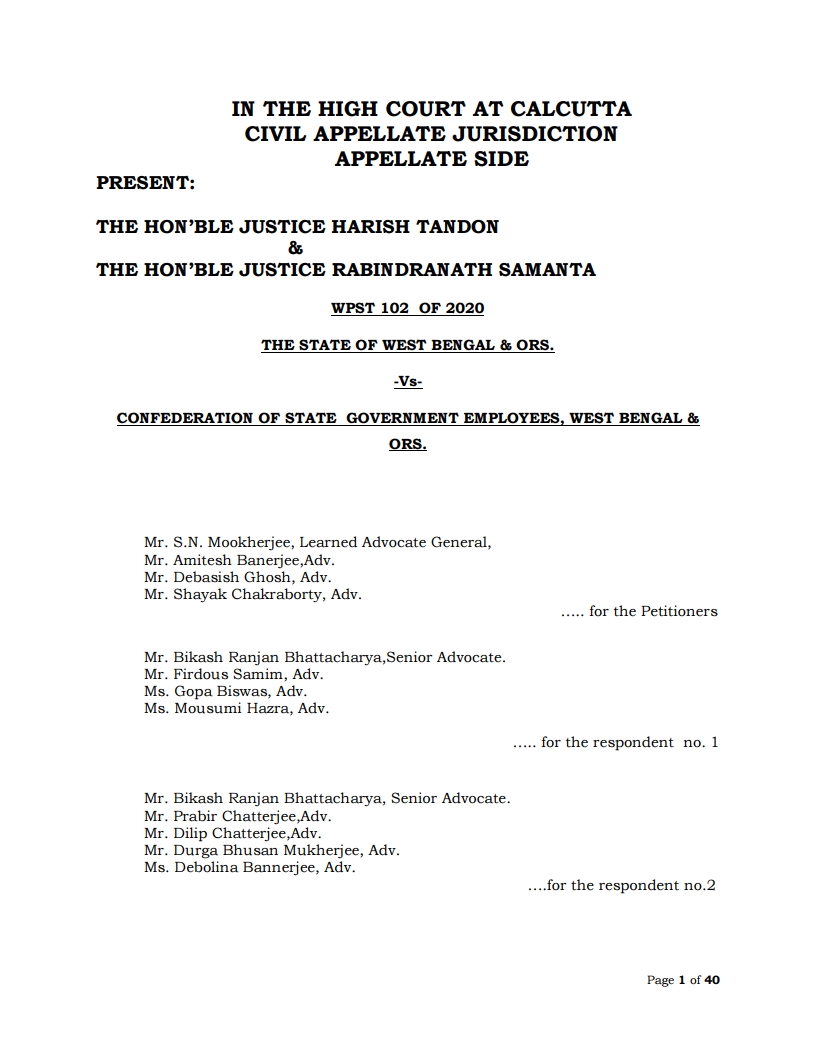



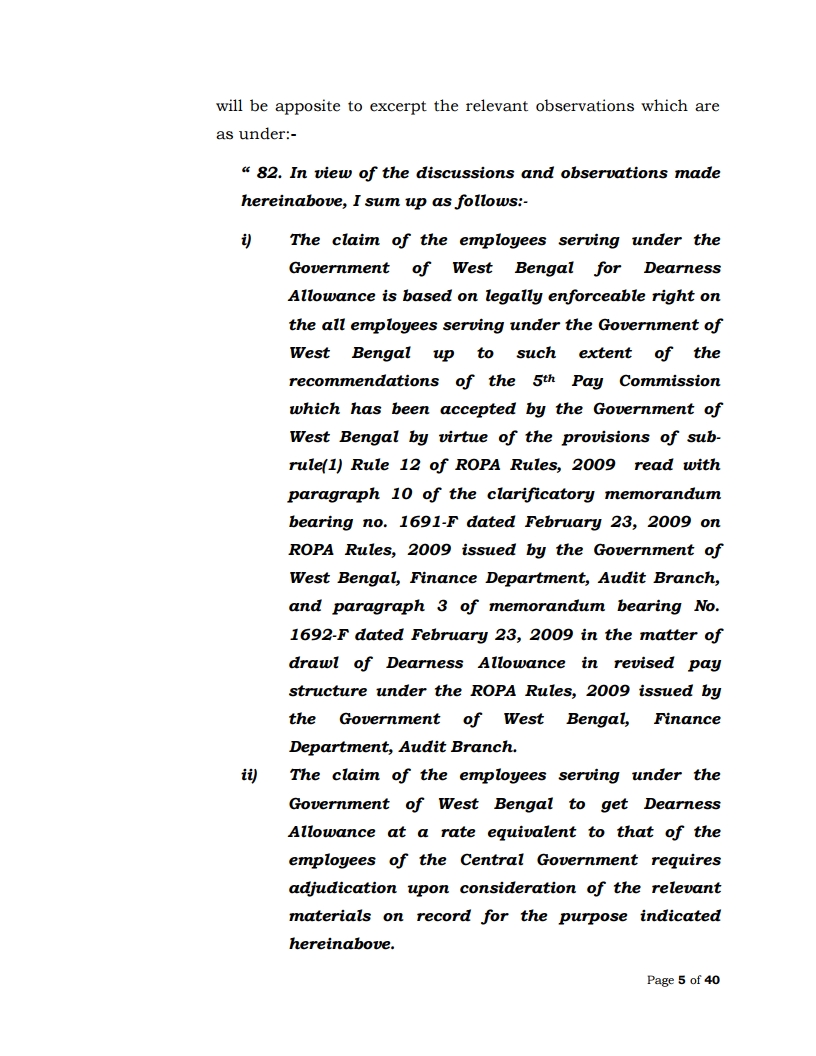
















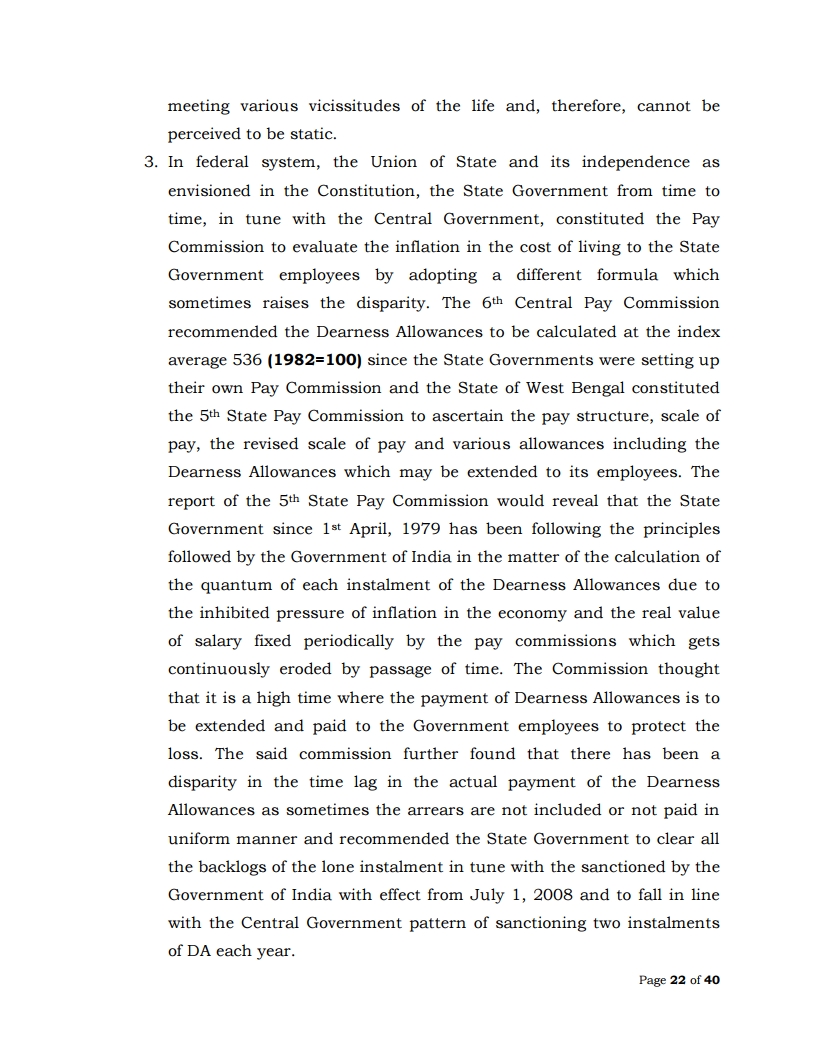


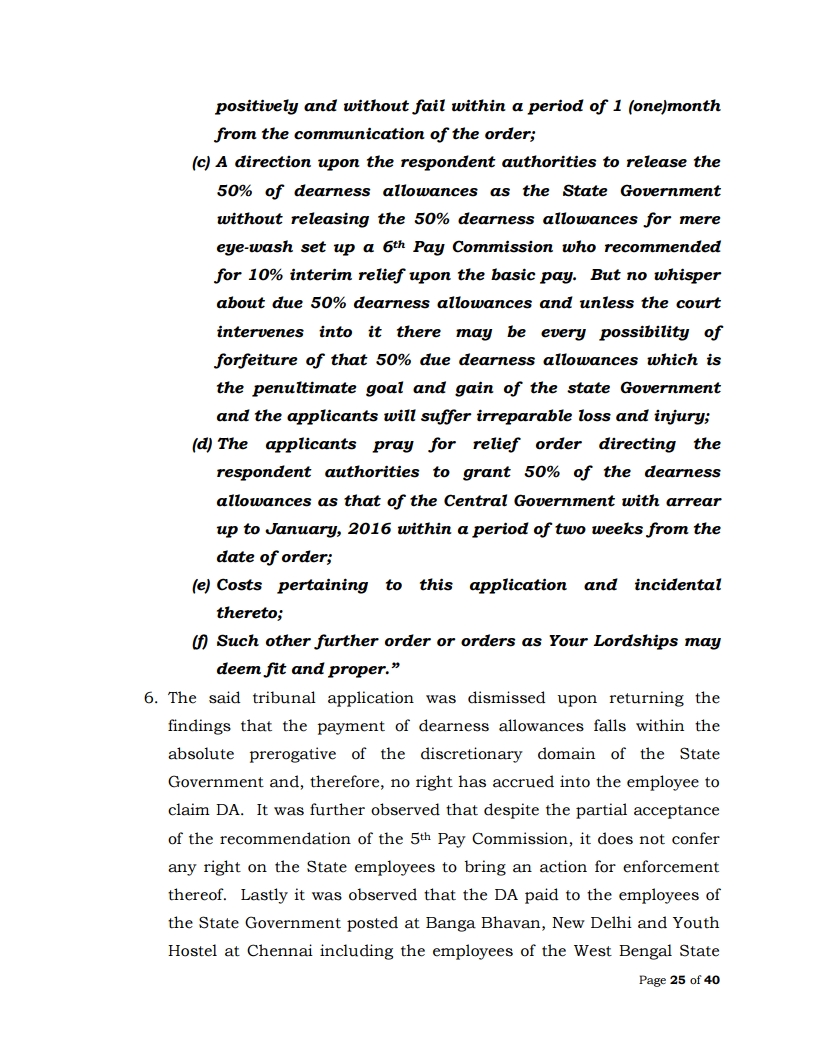


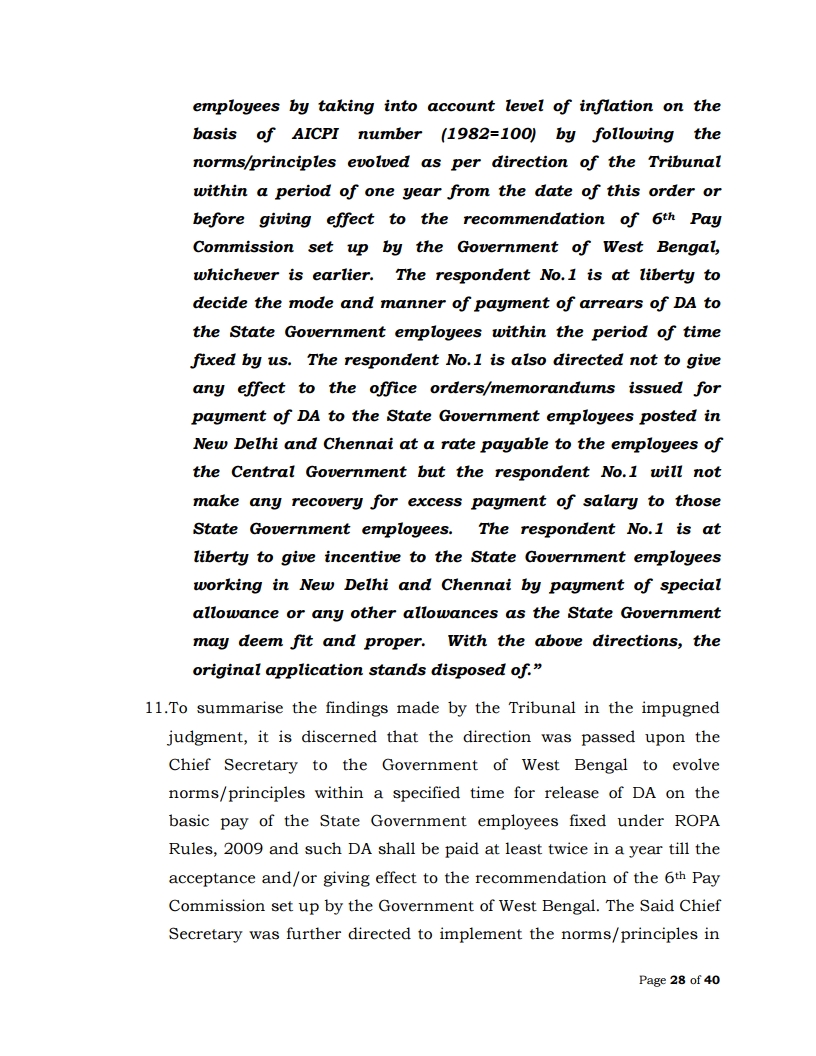











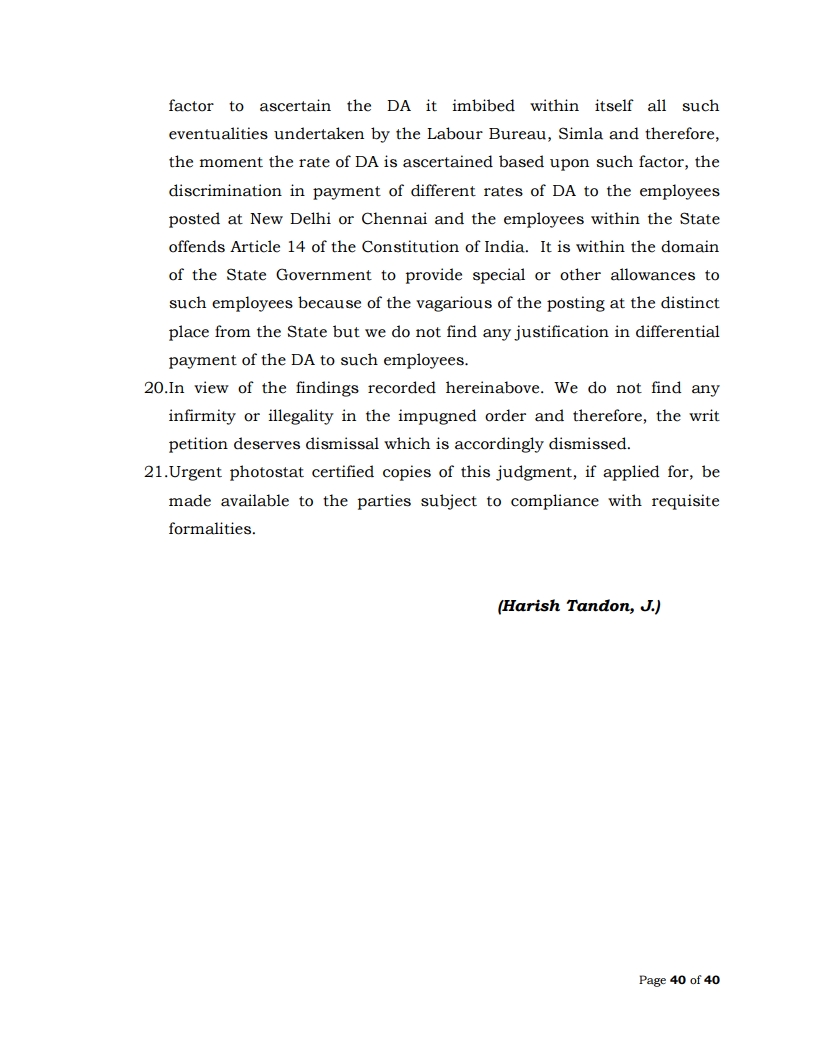

Comments